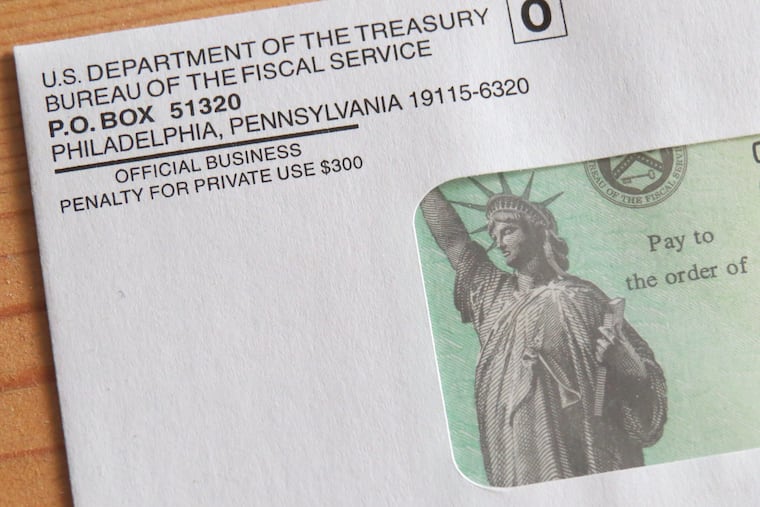Philadelphians need third-round stimulus payments to be issued smoothly this time | Opinion
In December, nearly 10% of Philadelphia-area households reported not having enough food to eat. Relief needs to come fast.

Just before taking office, President Joe Biden unveiled his American Rescue Plan, a $1.9 trillion coronavirus response plan that would, among other things, fund a massive scaling up of vaccinations and provide relief to struggling families and small businesses. As Congress debates Biden’s proposal — Senate Democrats could push it through as a budget resolution as early as Friday — one hot-button issue is the $1,400 “stimulus payments” for eligible people. This would be the third round of such relief: payments of up to $1,200 per person were distributed last April, and another round of $600 payments was completed in January.
Economists disagree over whether these third-round payments are appropriately targeted. While the payments provide much-needed aid to households most impacted by the pandemic, they also go to households that have not experienced job or income loss, which some view as unfair. It also makes the payments less effective as a way to stimulate the economy, as higher-income households tend to save the additional income rather than spend it. On the other hand, paying nearly everyone has the appeal of being politically attractive to a broad swath of the population, and is a quick way to provide relief to those who are struggling.
» READ MORE: Biden unwilling to settle for a fraction of the $1.9 trillion in federal stimulus he is seeking
Indeed, many people are struggling. Earlier this week, the U.S. Census Bureau released new data from its Household Pulse Survey, which includes approximately 1,600 households from the Philly area, providing a real-time glimpse into how Philadelphians are faring.
The news is grim. In December, nearly 10% of Philadelphia-area households reported not having enough food to eat. Thirty-four percent of Philly homeowners were not fully confident they could make next month’s mortgage payment. When asked whether they expect that anyone in the household will experience a loss of employment income in the next four weeks, more than a quarter of Philadelphians answered yes. Mental health measures like anxiety and depression were also worryingly high, with 36% of respondents feeling anxious or depressed more than half of the past seven days.
For households like these, the next relief payments cannot come soon enough. The IRS distributes these payments, which are actually tax rebates paid in advance, mostly through direct deposit. Thus far, it has used account information from filers’ 2019 tax returns. In the absence of that information, stimulus payments are sent by mail as checks or debit cards.
The first two rounds of distribution were plagued by mistakes and mix-ups. Millions of tax filers who used tax preparation services such as H&R Block or TurboTax did not initially receive their payments because the IRS erroneously deposited them in temporary accounts that were no longer accessible to the individuals. Eligible individuals without direct deposit information on file, as well as those without bank accounts (13% of Philadelphia households are unbanked), received debit cards. Some reported they had thrown the mail containing the debit card away because it looked like junk mail.
Nonetheless, these payments provided tangible relief to many of the people most negatively impacted by the pandemic. The Census Bureau reports that most households — especially those with incomes below $75,000 — spent the money on household expenses like food, rent, and utilities.
» READ MORE: Here’s how some Philadelphians plan to spend the $600 stimulus check
The third-round payments will be the largest most families have received, so it is critical that this round runs more smoothly. If they are distributed after Feb. 12, when this year’s tax season begins, the IRS may base third-round payments on 2020 returns, which would solve the problem of outdated direct deposit information for some filers. For those receiving their stimulus by mail, experience with the prior two rounds may help them know how to track their payments and avoid confusing the envelopes for junk mail. But the government should do all it can to increase awareness.
The challenge of distributing stimulus payments also has broader implications. It points to the need to bring unbanked households into the banking system, a topic explored by our colleague John Caskey. And, like the botched rollout of Healthcare.gov or the confusing, decentralized distribution of COVID-19 vaccines, it highlights the importance of well-designed systems for quick and effective policy implementation. Errors and disorganization can undermine the government’s intentions to help people in need.
With respect to coronavirus relief payments, here’s hoping the third time’s a charm.
Erin Todd Bronchetti and Ellen B. Magenheim are economics professors at Swarthmore College.
The Philadelphia Inquirer is one of more than 20 news organizations producing Broke in Philly, a collaborative reporting project on solutions to poverty and the city’s push toward economic justice. See all of our reporting at brokeinphilly.org.